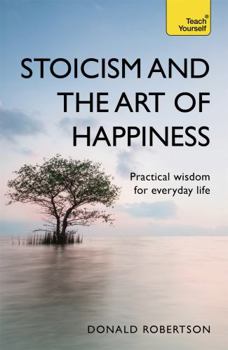What do you think?
Rate this book


224 pages, Paperback
First published January 1, 2013


"This book is about Stoicism, a philosophical tradition founded in Athens by Zeno of Citium around 301 BC, which endured as an active philosophical movement for almost 500 years, and still fascinates people today. However, it’s also a ‘how to’ guide that will hopefully show you ways in which Stoicism might provide, or at least contribute towards, a ‘philosophy of life’ for the modern world – an art of living with Happiness that aspires to be both rational and healthy.
If you ask most modern philosophers ‘What’s the meaning of life?’ they’ll probably just shrug and say that’s an unanswerable question. However, the major schools of ancient philosophy basically each proposed a different answer to that question. In a nutshell, the Stoics said that the goal (telos, ‘end’ or ‘purpose’) of life is consistently to live in harmony and agreement with the nature of the universe, and to do this by excelling with regard to our own essential nature as rational and social beings. This is also described as ‘living according to virtue’ or aretê, although as you’ll see it’s best to think of this as meaning excellence in a broader sense than the word ‘virtue’ normally implies – something I’ll explain later."
"Remind yourself that the past and future are ‘indifferent’ to you, and that the supreme good, and eudaimonia, can only exist within you, right now, in the present moment..."
...The ‘here and now’:
Ancient Stoicism was very explicitly a ‘here and now’ philosophy, although many people today associate this notion more with Oriental philosophies, particularly Buddhism. In fact, the modern English expression ‘here and now’ actually comes from a common figure of speech in Latin: hic et nunc. The exercise of living centred in the present moment is emphasized throughout Marcus Aurelius’ Meditations. For Stoics, the past and future are ‘indifferent’ because they’re not under our control, ‘good’ and ‘evil’ can only truly reside in the present moment. Humans surpass other animals in their ability, through language and reason, to recall the past or plan for the future. However, doing so leads us to neglect the seat of our volition in the present moment, where virtue potentially originates. Stoics therefore train themselves to focus attention on the present moment, often by reminding themselves that they could potentially die the following day and should therefore ‘seize the day’ and seek to flourish and attain Happiness in the ‘here and now’. In other words, the most important thing in the universe is situated within you, right here in the present moment."
"Try it now: Contemplating the ‘festival’ of life’
Imagine that you’re attending a big music ‘festival’ like Glastonbury, a sporting event like the modern Olympic Games, or a busy exhibition in a museum or art gallery. Think of this as a metaphor for your life, as you go about your daily business. You’re only a visitor, soon it will all be over, and eventually the whole site will be cleared. Think of your ticket as a gift and that you’re privileged to be here, even if it only lasts a matter of days. None of this really belongs to you, the whole experience is temporary and on loan.
Your job is to ‘take it all in’ properly, and really appreciate the opportunity. Study the whole spectacle unfolding around you, in a detached and philosophical manner, as if seeing it all for the first time. The majority of people may be absorbed in pursuing wealth, seeking reputation, or indulging in empty pleasures. If occasionally they’re rowdy or bump into you, that’s inevitable – it’s just part of the natural hustle and bustle. There’s no point complaining, now you’re here, if you don’t like the programme of events – don’t be a resentful or ‘fault-finding’ spectator. Just be where you are and take each moment as it comes. Right now, this is all there is. In a nutshell, step back from the ‘rat-race’ and begin to really notice life, being grateful for the ‘here and now’."